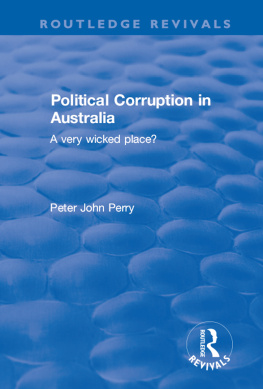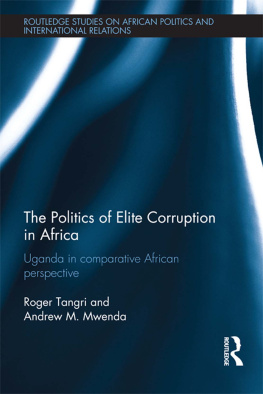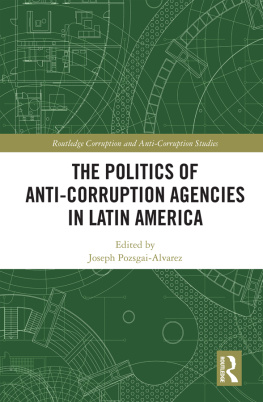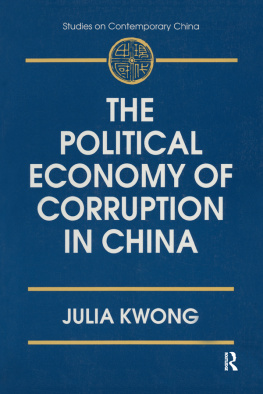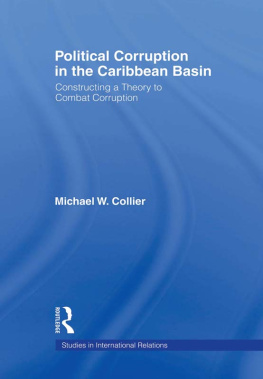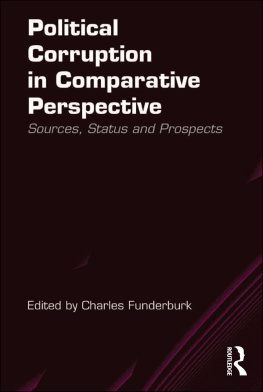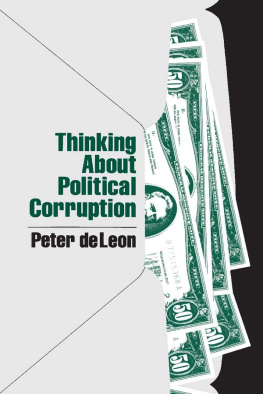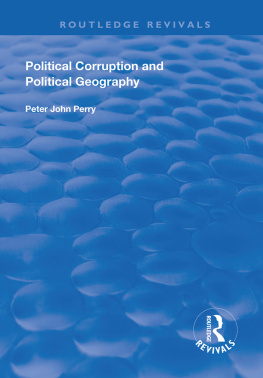POLITICAL CORRUPTION IN AUSTRALIA
For the congregation of hypocrites shall be desolate,
and fire shall consume the tabernacles of bribery
Job 15,34
Political Corruption in Australia
A very wicked place?
PETER JOHN PERRY
University of Canterbury, New Zealand
First published 2001 by Ashgate Publishing
Reissued 2018 by Routledge
2 Park Square, Milton Park, Abingdon, Oxon, OX14 4RN
711 Third Avenue, New York, NY 10017
Routledge is an imprint of the Taylor & Francis Group, an informa business
Copyright Peter John Perry 2001
All rights reserved. No part of this book may be reprinted or reproduced or utilised in any form or by any electronic, mechanical, or other means, now known or hereafter invented, including photocopying and recording, or in any information storage or retrieval system, without permission in writing from the publishers.
Notice:
Product or corporate names may be trademarks or registered trademarks, and are used only for identification and explanation without intent to infringe.
Publishers Note
The publisher has gone to great lengths to ensure the quality of this reprint but points out that some imperfections in the original copies may be apparent.
Disclaimer
The publisher has made every effort to trace copyright holders and welcomes correspondence from those they have been unable to contact.
A Library of Congress record exists under LC control number: 2001090082
ISBN 13: 978-1-138-70278-3 (hbk)
ISBN 13: 978-1-315-20706-3 (ebk)
Contents
This is not the book which I originally intended to write. That intention, to produce a comparative study of political corruption in Australia and New Zealand, has been superseded by the more modest, yet still considerable, target of an account of the phenomenon in Australia. Studies at this scale, and recall that Australia is a continent as well as a country, are relatively rare, an underdeveloped genre within a still rather underdeveloped branch of scholarship. The task in hand, the genre to be exemplified, is the short and introductory account of where political corruption is to be located in a particular country and how that situation was reached. The operation necessarily explores matters historical, geographical, political and social, to name but a few, but the result is not an exercise in any one of these disciplines. (Nor, it should be added, is it an attempt to establish a new one.) Rather it is an expression of dissatisfaction with the longstanding, albeit now diminishing, neglect of the phenomenon of political corruption by scholars, and an attempt to redress this situation at a particularly important scale.
Approximation is a better description than introduction. The book is concerned with the themes gross anatomy, physiology and pathology rather than its fine structures, for that is all that is as yet possible at this scale and at this stage. My great hope is that it will stimulate more work, at a similar scale elsewhere and at a finer resolution within Australia. One obvious omission which already occurs to me is the absence of cartoons from this volume. The few on the subject of political corruption that are well known scarcely need to appear again, and an absence of time and resources prevented the necessary research to excavate new and cogent examples. There is a whole history of the subject along these lines ripe for the picking by someone with access to one or more of the great Australian libraries: go for it!
The weakness of the specialist base and the hope and expectation that the book will interest a wider audience, and not merely the handful of Australian experts in the field, account for the considerable element of more general discourse on corruption with which the book begins. It has not been thought necessary to reference this introductory material or the three final systematic and at times speculative chapters as fully as the empirical material of the central section.
Finally the title: designed to provoke rather than irritate or condemn, it is drawn from comments made by Parkes eventually premier of New South Wales on his arrival in 1839, and reported by Hancock in what became a very famous book in 1930. It thus links two very important Australians, a politician and a scholar whose thoughts in this area are still worth exploring. I added the sub-title and, more importantly, the question mark. And my answer is in the negative. Australia is not a very wicked place, but it does present us, and not least in its ongoing efforts to combat political corruption, with a range of experiences worth recounting for their substance, challenging in their demands on the apparatus and practice of scholarship, and highly relevant to the many countries now coming to grips with a real world problem which Australians are now tackling with exemplary energy and effectiveness.
Peter Perry
Christchurch, New Zealand
Individuals write books, but that enterprise is impossible without the support of family, friends, communities and institutions. When the book is put together in three places and over several years the duty and pleasure of saying thank you becomes even more extensive. Firstly then the love and support of my wife, children and friends in Lyttelton and Christchurch is gratefully acknowledged, alongside that of colleagues at the University of Canterbury both in the Department of Geography (which also provided financial support) and more widely. They have been helpful, encouraging and tolerant. A period of study leave in 1999 took me to England, again with and to supporting and welcoming family and friends. In Cambridge I enjoyed the fellowship and hospitality of Clare College and the friendly professionalism of the University Library (especially of Terry Barringer in her position as librarian of the Royal Commonwealth Society collection). A visit to the Shelby Cullom Davis Center for Historical Studies at Princeton University proved both enjoyable and stimulating. At the most particular level Linda Harrison was as usual a most helpful and super-competent typist. The staff of Ashgate have been equally supportive. Three colleagues, Peter Hay (University of Tasmania), Len Richardson (University of Canterbury) and Jon Barnett (University of Canterbury) have read and commented upon drafts. Together we have made the book: responsibility for what it says remains with the author alone.
ADB | Australian Dictionary of Biography |
AEcHR | Australian Economic History Review |
AJPA | Australian Journal of Public Administration |
AJPH | Australian Journal of Politics and History |
ANU | Australian National University |
CJC | Criminal Justice Commission |
HS | Historical Studies (after 1988 called Australian Historical Studies) |
ICAC | Independent Commission Against Corruption |
JRAHS | Journal and Proceedings of the Royal Australian Historical Society |
NSW | New South Wales |
PS | Political Science |
SA | South Australiana |
THRAPP |

